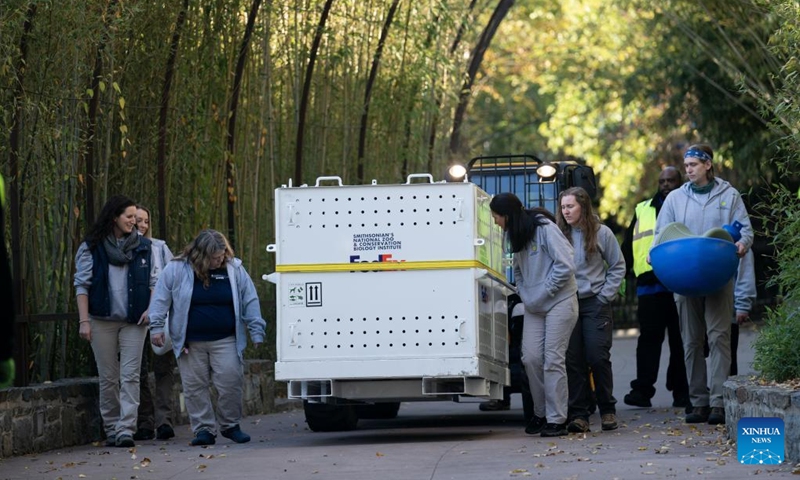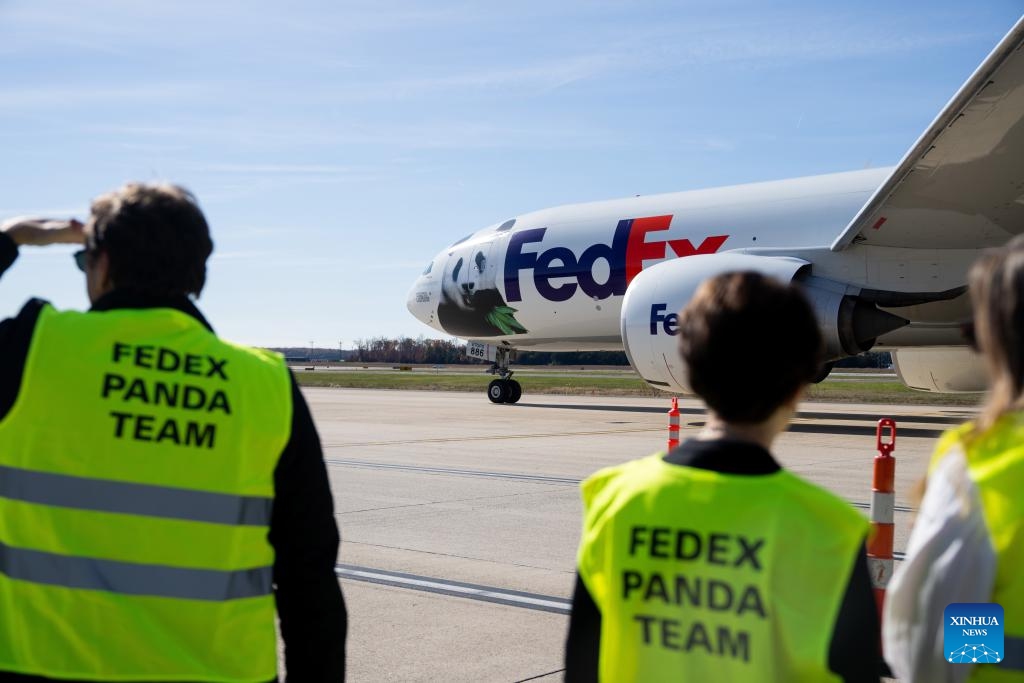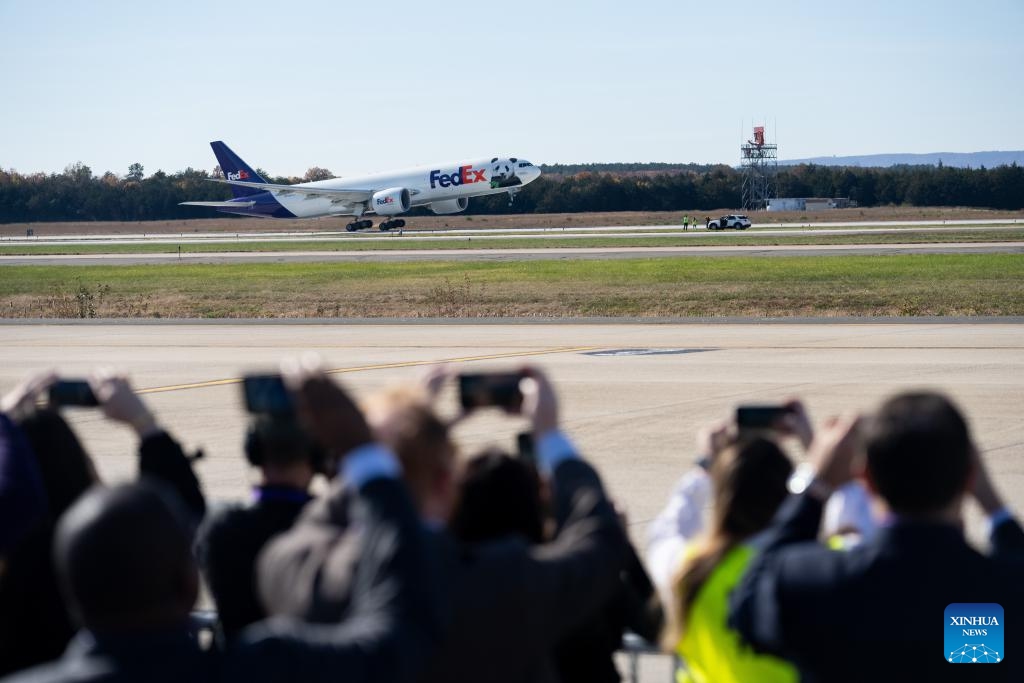
Staff members transfer a cage holding giant panda Mei Xiang at the Smithsonian's National Zoo in Washington, D.C., the United States, Nov. 8, 2023.(Photo: Xinhua)

An airplane transporting giant pandas is seen at the Dulles International Airport in Dulles, Virginia, the United States, on Nov. 8, 2023.(Photo: Xinhua)

An airplane transporting giant pandas takes off from the Dulles International Airport in Dulles, Virginia, the United States, on Nov. 8, 2023.(Photo: Xinhua)

Special crates holding giant pandas are ready to be loaded onto an airplane at the Dulles International Airport in Dulles, Virginia, the United States, on Nov. 8, 2023.(Photo: Xinhua)
Giant pandas Mei Xiang, Tian Tian and their male cub Xiao Qi Ji departed the Smithsonian's National Zoo in Washington, D.C. on Wednesday, wrapping up their stay in the United States and embarking on a journey back to China.
At a brief ceremony held at the zoo, keepers escorted three special crates each holding one panda to travel on Olmsted Walk in front of members of the press. The crates were later loaded on trucks heading to the Dulles International Airport.
Prior to the emergence of the panda crates, the zoo staff loaded supplies including 100 kg of bamboo on the trucks for the pandas to consume during their flight to China.
In remarks addressing the media, Brandie Smith, director of the Smithsonian's National Zoo and Conservation Biology Institute (NZCBI), hailed the China-U.S. collaboration on giant panda conservation that dated back over 50 years, which facilitated Mei Xiang and Tian Tian arriving in Washington, D.C. in 2000 and producing four adorable cubs in the years that followed.
"They are an iconic animal for the zoo, for the District of Columbia, and for our country as well," Smith said of the panda couple and their offspring. "There are billions of people who have admired, celebrated, loved our giant pandas, and have participated in their conservation," she said, adding the zoo was honored and grateful to their Chinese counterparts for making joint efforts in panda research and breeding.
Smith said it's been hard for her to accept the fact that the three giant pandas are leaving - not only in this morning, but also in the days leading up to their departure. "But ultimately our focus today is on the safe transport of these animals to China. And it's a moment of joy because this is one more step in 50 years of a successful giant panda conservation program."
She expressed the hope that such cooperation would continue for another 50 years. "Please know that the future is bright for giant pandas. We remain committed to our program and we look forward to celebrating with all of you when pandas can return to D.C.," the director said.
Xu Xueyuan, minister of the Chinese embassy in the United States who also attended the event, said that since the arrival of Meixiang and Tian Tian in Washington 23 years ago, which also marked the beginning of cooperation between China and the NZCBI, Chinese and U.S. teams "have worked closely and fruitfully on giant panda conservation and research."
Such collaboration has resulted in remarkable accomplishments on giant panda breeding, disease prevention and treatment, as well as public education, Xu said, adding that in so doing, professionals from the two countries have "contributed strongly to the mutual understanding and friendship between the Chinese and American peoples."
Noting that the NZCBI has provided "loving care" for Mei Xiang, Tian Tian and their cubs, which feature "high standard facilities" and "leading veterinary and research expertise," Xu said the pandas "have delighted millions of visitors in the U.S. and from other parts of the world. "
"Today, agreed by both sides, it is time for Mei Xiang and Tian Tian to bring Xiao Qi Ji back home," Xu continued, adding that the three pandas are in good health and ready for the flight.
"Giant pandas belong to China. Giant pandas also belong to the world," Xu said. "China will continue to work closely with cooperation partners, including the United States, on the conservation and research of endangered species and biodiversity protection. We'll make greater contributions to the sustainable development of this planet and the friendship between people of all countries."
When the convoy arrived at the Dulles International Airport, journalists and officials had already gathered on the tarmac, expecting the final farewell moment for the cuddly cuties.
A FedEx Express Boeing 777 Freighter with a huge giant panda picture painted outside the cockpit was parked with its cargo cabin gate open, ready to load the pandas onboard and carry out the transport mission. FedEx had flown similar missions for other pandas in the United States that went back to China.
Smith gave some remarks again. "We are celebrating the success of the world's longest-running conservation program for a single species. And the more than 50 years that we have been working with these animals, giant pandas have been moved off the endangered species list," she said, receiving a big round of applause.
"Our partners in China, the Conservation and Research Center for the Giant Pandas, have been just phenomenal partnership to work with, learning to care for these species and saving them in the wild," the director added.
As the crates were being loaded onto the plane one after another, Mei Xiang tried to catch a final glimpse of Washington from the window of her crate, as if she was really saying final goodbye to the city where she had spent 23 years, and to all those who loved and would be missing her so much.
With the plane's engine roaring and the crowd cheering, the pandas embarked on their journey back to their homeland.
As part of the effort to ensure a comfortable flight for the three pandas, two keepers and a veterinarian will accompany the bears on board the plane, which is heading for the southwestern Chinese city of Chengdu. The duration of flight is expected to be about 19 hours, including a refueling stop in Anchorage, Alaska.
